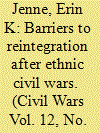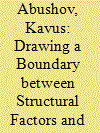| Srl | Item |
| 1 |
ID:
101342


|
|
|
|
|
| Publication |
2010.
|
| Summary/Abstract |
This article evaluates the record of minority return in Croatia, Bosnia and Kosovo to assess the viability of ethnic reintegration in the wake of protracted sectarian violence. Comparative analysis reveals that the logic of post-war ethnic spoils has greatly limited the success of such programmes. What success has been achieved is largely due to third party efforts to disrupt patronage networks and challenge post-war authorities. I conclude that these factors are more significant barriers to reintegration than inexorable ethnic hatreds and fears derived from memories of war. Because such barriers are more readily overcome than entrenched grassroots hostilities, there may be more hope for reintegration than previously thought. However, the systematic failure of the international community to protect and assist prospective minority returnees suggests that continued scepticism of post-war reintegration is in order.
|
|
|
|
|
|
|
|
|
|
|
|
|
|
|
|
| 2 |
ID:
188043


|
|
|
|
|
| Summary/Abstract |
This article focuses on the causes of ethnic civil wars, and argues that in order to develop a better understanding of their onset and intractability, one needs to distinguish different types of ethnic civil wars from each other. It first evaluates structural factors in the outbreak of ethnic conflict and then proceeds to discuss ideational factors and finally suggests a theoretic framework of understanding ethnic conflict based upon identity. It develops hypotheses that would allow to discern structuralist explanations from ideational ones and in this way contributes to the literature that tries to understand the causes of ethnic civil wars. To have a clear understanding of the suggested hypotheses, empirical evidence is provided from the post-Soviet space, namely conflicts such as Abkhazia, Crimea, Chechnya, Nagorno-Karabakh, and South Ossetia.
|
|
|
|
|
|
|
|
|
|
|
|
|
|
|
|
| 3 |
ID:
151270


|
|
|
|
|
| Summary/Abstract |
Why do most civil wars occur in a relatively small number of countries? We answer this question by analyzing how civil wars diffuse in multiethnic states. Our theory outlines two motivation and two opportunity mechanisms that trigger additional ethnic rebellions in the same state. First, ongoing civil wars motivate members of other ethnic groups to mobilize in reaction to the negative externalities of nearby conflict. Second, ethnic groups emulate nearby rebel groups as a means of addressing preexisting grievances. Third, fighting multiple civil wars drains state capacity, opening the door for additional challengers to rebel against the government. Finally, long-lasting civil wars signal that the state is unable to defeat active rebels, thus creating incentives for new challengers to take up arms. We test our mechanisms in all multiethnic states with a history of armed conflict between 1946 and 2006. Using Geographic Information Systems, we construct overlap and minimum distance measures between ethnic groups’ settlement patterns and conflict zones. Our statistical analysis indicates that new ethnic civil war onsets are more likely in the vicinity of ongoing armed conflicts. Ethnic civil wars also diffuse as governments face an increasing number of rebels and longer rebellions.
|
|
|
|
|
|
|
|
|
|
|
|
|
|
|
|